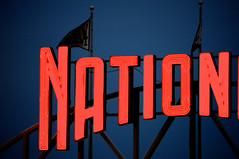The deal was, in 2005, when the city agreed to finance with 30-year bonds the building of a new baseball stadium, that city would levy taxes of $8,000 to $28,000 per year on the city’s biggest businesses. The businesses agreed to pay the tax, hoping that the ballpark deal would spur growth along the Anacostia Waterfront, and create new markets for them to operate in. One of the tenets of the agreement was that, like for the similar bonds to build the Verizon Center, all monies collected by this tax and other methods of stadium-based revenue generation, would be used to pay down the bonds. That meant, if the city collected extra revenue over projections, that money would be used to make the life of the bond shorter. In the case of the Verizon Center, the city paid off those bonds, and removed those taxes, in half the time that had been proposed.
Cue the budget crisis, which has city leaders scrambling to shake out every last dime from the couch. You can guess what happens next. They’re using the additional revenue to fund the city budget, something they told businesses that they would not do.
It’s disingenuous to say that the city will keep the tax “permanently” as Ilya Somin writing for Volokh says, because the tax on Nats Park, like the tax on the MCI Center (now Verizon Center) will expire when the bonds are repaid. If the city can pay it out ahead of schedule, as they should do with these monies, that closes the schedule on the ballpark payments in 2021, instead of 2035. It was very interesting to read the quote from DCFPI in the Examiner piece, given their contention that the ballpark couldn’t possibly pay for itself ahead of schedule. Guess that research was off, eh boys?



